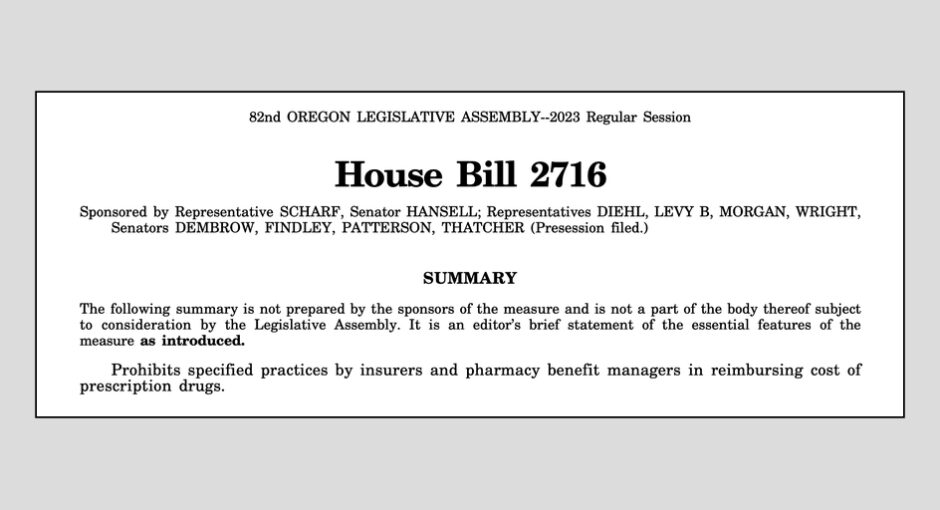Oregon legislators have introduced a bill that would prohibit discriminatory practices by pharmacy benefit managers and insurance plans against 340B pharmacies, including reimbursing a 340B pharmacy less for prescription drugs compared with non-340B pharmacies.
If passed later this year, House Bill 2716 would echo similar laws enacted in 20 states thus far that target PBM policies that discriminate against 340B covered entities and/or pharmacies that dispense 340B-priced drugs.
“It’s really about creating a level playing field,” said Ryan Gibbard, president of the Oregon Society of Health-System Pharmacists. “This bill is just tightening up language we already had existing in Oregon, based on what we had seen in other states, where they’ve had success. We want to protect health-system pharmacies and 340B pharmacies and the patients they serve from any sort of discriminatory practices,” he added. Gibbard said the Oregon bill was modeled largely after a similar measure passed in Colorado last year.
Other key provisions of the bill prohibit PBMs from:
- imposing a fee, charge-back, or other adjustment on a reimbursement claim based on the pharmacy’s participation in the 340B program.
- reimbursing a pharmacy or pharmacist an amount less than the PBM reimburses an affiliate of the PBM for the same drug or services.
- imposing qualifications on pharmacies or pharmacists or otherwise limiting or restricting pharmacies or pharmacists from participating in the PBM’s network based on a qualification that is beyond the requirements for licensing adopted by the State Board of Pharmacy.
“What we’re seeing is, the PBMs would mark [340B pharmacies] as out-of-network pharmacies, they would alter their reimbursement agreements to pay less than they were paying to other network, or preferred pharmacies for the same drugs, for the same patients.” Gibbard said.
He noted that PBMs rationalize the lower reimbursement rate by pointing to the deep discounts at which the 340B-priced drugs are acquired. “But that’s not the intent of the 340B program,” he said. “[It] is to provide the safety-net hospitals and rural and underserved parts of Oregon and across the county access to medications at a price that allows them to use their limited resources to provide essential care for their communities.”
Gibbard said the pending legislation might be amended to extend protections beyond 340B pharmacies to include other 340B program participants. “We are partnering with some of the other providers in the state … physician groups especially.” He said the groups want language included in the bill that would cover physician-administered drugs that are purchased by the practice site and do not go through a pharmacy.
Bill Also Would Curb White Bagging
The Oregon bill also includes language aimed at curbing the practice known as “white bagging,” said Marty Carty, director of governmental affairs at the Oregon Primary Care Association (OPCA), a group representing federally qualified health centers that pushed for the added language. “[White bagging] allows the payor and the wholesaler to bypass the 340B program,” he said, by categorizing a certain prescription drug as a ‘specialty drug’ that is shipped directly to the provider. “Payors can skip reimbursing the medical benefit for that patient encounter,” he said.
He added, “The worry is that payors often have the opportunity to decide which medications are considered specialty and which aren’t, and it can be very arbitrary. Patients don’t get the choice of whether their medication comes in the mail, or whether they pick it up at their doctor’s office or pharmacy.” The bill’s added provisions specific to the 340B program would change that. “It says you can’t discriminate against patients … because they are receiving their care at a 340B covered entity or require that they receive their prescriptions in a certain way,” he said.
Carty said the white bagging issue was addressed in 2019 PBM reform legislation, but the current legislation would beef up enforcement.
Gibbard said the anti-discrimination bill was off to an auspicious start. “We have bipartisan support for this bill already,” he said. “There’s a large percentage of Oregonians that are represented from rural communities where 340B access is very beneficial, so I think we’re going to see quite a bit of support at both the House and Senate level.” What’s more, he added, “We have some really strong allies on the health care committee, so hopefully, our priorities will become their priorities, too,” he said. The bill will likely be voted on this summer, Gibbard said.
He also predicted the anti-discrimination movement would continue. “I think it’s going to continue to snowball as more and more states find success in this arena,” Gibbard said. “This conversation is happening nationally and people are becoming more and more aware of how the role of PBMs has evolved from a fiduciary caretaker role to more of a big business model.”
340B Report will cover 340B-related bills in other states in future issues.


